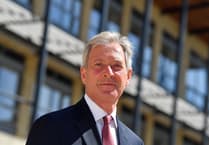Objectors condemned the scheme at the town council’s annual meeting in April, protesting Haslemere could lose a vital asset for good if it became a “cash cow”.
Waverley’s executive agreed the resurfacing and charging proposal for Wey Hill Fairground car park in February for health and safety reasons and offered a borough council-owned area of woodland near Sun Brow as a suitable ‘swop’ for the loss of common land.
Neighbourhood plan group Haslemere Vision opposed the proposals at April’s meeting.
Following last week’s announcement, the group’s chairman Stewart Brown said: “Haslemere Vision believes strongly that Waverley’s proposal to apply to deregister the Wey Hill Fairground as common land is premature.
“Wey Hill Fairground has been common land for over 100 years. Ownership was transferred from Haslemere Urban District Council to Waverley on local government reorganisation in 1974. As such, Waverley has a clear duty to manage and/or develop the site in the interest of the residents of Haslemere.
“The site is in a pivotal location in the town and could potentially help to link Wey Hill and the High Street visually and functionally. Responses to the Haslemere Vision community consultation in 2015 indicated support for a mixed development of the site including parking, housing, commercial and public space.
“In light of this, we welcome the fact that Waverley proposes to allocate the site for housing development in its Local Plan part two, but we are very concerned that they insist they have no plans to develop the site for six years. Why the delay?
“If development of the site is a viable option it will indeed be necessary to deregister the site.
“However, in light of Waverley’s decision to delay any development for six years, the proposal to apply to do so now is premature. We understand that in 1994, Waverley received consent to formalise the parking arrangement and introduce charging on the site under section 194 of the Law of Property Act 1925.
“This Act was subsequently repealed but we believe it is still possible to obtain such a consent under section 38 of the Commons Act 2006 without deregistering the site.
“Waverley must understand many in the community have serious suspicions that, once the council is in receipt of parking revenues, it will never proceed with further development.
“As a result Waverley is much more likely to secure local support for appropriate short term parking proposals if the site remains common land until plans for the longer term future of the site are agreed.”
Town councillor Nikki Barton, who objected there was no need legally to deregister the common land to introduce parking charges, back in March, backed Haslemere Vision’s opposition to this week’s move.
Mrs Barton said: “I share the concerns of many who believe Waverley’s tactic is to deregister the common land so as to ensure its highly lucrative ‘cash cow’ car park is permanent.
“This is all the more outrageous, not only for ignoring the community’s vision for a creative development for Wey Hill, but also because the revenues from the car park will not even have to be directed to serve Haslemere needs.
“I acknowledge the financial pressure on all local councils, but it is simply unacceptable to resort to effectively commandeering a community asset in this way, with no overall good for the community which the land is supposed to benefit.”
A Waverley spokesman said: “The council has sought external legal advice and concluded deregistration of the land is the most appropriate route in order to achieve its objectives.
“This way a larger and more suitable area of commonland will be retained and allow the council to resurface and regulate the car parking activity on the site in the short-term.
“The council is excited the work could open up a range of development opportunities for the site in the longer term and will work with partners to develop these proposals.”




